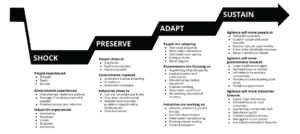Few events in history have profoundly affected the average person’s life and work as the global pandemic, COVID-19 has. For instance, seafaring brought colonialism to Asia, Africa and South America. This devastated the lives of many, forcing colonies to learn how to adapt to colonization. The industrial revolution turned artisanal communities into machine operators. The storming of Bastille and the French revolution paved the way for liberal democracies and heightened political awareness among citizens.
Joining this list of global cataclysms is COVID-19 that both our society and economy are still grappling to come to terms with. There have been about 21.7 million cases across 214 countries, with a death toll of 776,000. Unlike a lot of us had hoped for, we now know that this is a complex global event with unprecedented consequences.
Navigating such a post-pandemic’s future, demands of humanity, a higher order life skill. We’re calling this skill ‘Resigience’ — a combination of agility and resilience. We believe Resigience, especially in the face of uncertainty, can make one both adaptable and tenacious.
The idea of Resigience evolved from our observation of how the world has been reacting to COVID-19, right from the beginning. As we studied global responses, we noticed four stages of reaction to the pandemic’s evolution — shock, preserve, adapt and sustain.
Stage 1: Shock
As the pandemic spread, it quickly became apparent how devastating the consequences would be; thousands died, hospitals were overwhelmed, medical equipment and personnel became scarce. Doctors and staff were making tough decisions of who to save and who to let go. Gradually, more frontline medical personnel started falling sick, exacerbating the situation.
People panicked, stayed indoors and hoarded essential commodities. They were dissuaded from performing last rites for loved ones who had succumbed to COVID-19. Governments across the world responded by imposing varying levels of restrictions. Businesses that relied on discretionary expenses such as restaurants, travel and movies came to an abrupt halt.
Stage 2: Preserve
People moved to self-preservation mode. The lack of clear information and conflicting news did not help. Some started isolating themselves. Others halted all discretionary purchases — automobiles, new homes, even elective surgeries and treatments were postponed.
Conserving cash became imperative. Governments experimented with unlocking for short periods. Companies cut salaries and laid people off. The world hit pause and while some parts of the world are still in this stage, many have moved on to the next.
Stage 3: Adapt
Most of the world is in this stage now. We are beginning to accept the enormity of the pandemic’s impact on life and that it will last a few years. Travel as we knew it will not continue to exist. Industries recognize that earlier-held status quos are resulting in productivity losses. Some pivoted to produce COVID-19 essentials, like how breweries have begun manufacturing hand-sanitisers.
The medical community is creating vaccines and therapies for better COVID-19 care. Governments are altering policies and protocols to expedite the launch of drugs and vaccines. Read, USA’s Accelerating COVID-19 Therapeutic Interventions and Vaccines (ACTIV) partnership or the Indian Council for Medical Research announcing three Indian vaccines are in different phases of clinical testing at present.
Governments are pushing for local manufacture and consumption. The US is evoking the Defense Production Act and India’s Prime Minister is campaigning for Atmanirbhar (self-reliance).
Remote work is being actively embraced. Business models and delivery methods are adapting to a ‘work from anywhere’ reality. For instance, in Kerala, the South India, classes are telecast on TVs for those who do not have access to a computer and the Internet.
Stage 4: Sustain
It is sobering to know that even at the current ‘rate of spread’ only 0.15% of the world population are confirmed cases. This means, it will take several years for the global population to become immune to the virus. As COVID-19 continues to drastically alter the way we live, ‘adapting to’ becomes the accepted norm. In fact, there is talk of this and future generations making peace with the virus and finding ways to co-exist.
In the world of business, off-shoring for cost-optimization has proven risky, given many countries have halted manufacturing, and several cargos are still parked in international waters. Remote work has pushed the gig economy into fifth gear. And now, eCommerce is the first channel of choice.
To sustain this ‘new’ version of life will mean we cannot fight a new battle with old armour. Humanity will have to upgrade, as it has done, in the face of the inescapable global events that we have alluded to, in this article.
We see evidence of ‘Resigience’ becoming the key trait to imbibe.
Let’s look at why – First, the current wave of recovery requires people to tread with renewed hope, newer skills and nuanced etiquettes. Corporations will need to re-design business models and to cater to the customer’s new needs, without throwing away what they’ve built. governments, in their quest to localize production, will need to strengthen their health, financial and dependent ecosystems.
Second, agility is the ability to quickly and decisively respond in the face of uncertainty, and resilience is being able to quickly recover from a difficult situation. And combined, they form Resigience – the higher order life-skill that will help every system and person from school education to supply chain to business leaders to retail brands to local kirana stores adapt to the new reality.
